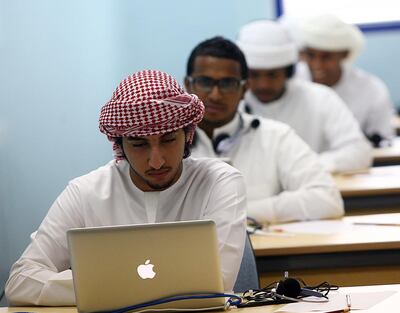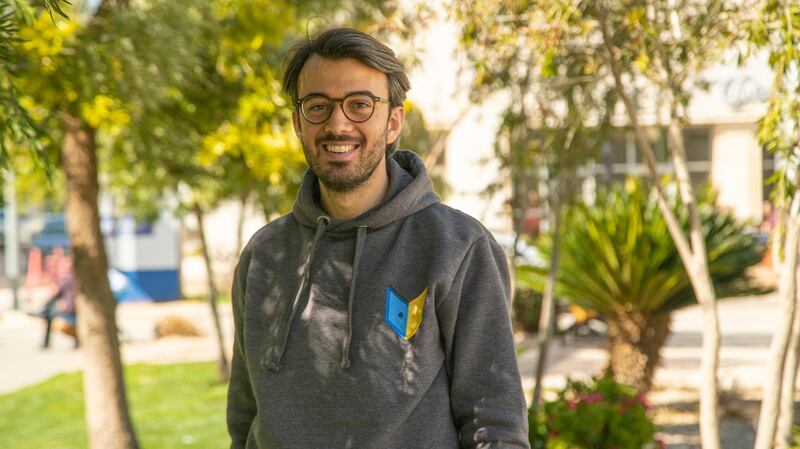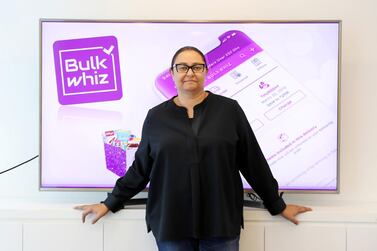As the coronavirus pandemic batters the global economy, hammers industries from manufacturing to aerospace and roils markets, the team behind education technology (Ed-Tech) start up Abwaab has never been busier .
When Jordan went into lockdown and closed schools to prevent the spread of Covid-19, the government contracted Abwaab to design and offer lessons for secondary students online and through broadcast on national television.
"The coronavirus crisis has completely catalysed our performance," says Hamdi Tabbaa, co-founder of the six-month old Abwaab. "We are two years ahead of schedule because of the crisis in terms of awareness about the product and learning online in general."
The Covid-19 outbreak has disrupted daily life across much of the world. The number of students affected by school and university closures in 138 countries has nearly quadrupled to 1.37 billion, about 80 per cent of the world's student population, according to a March 24 report by Unesco. This means more than three out of four children and youth worldwide are affected and nearly 60.2 million teachers are no longer in classrooms .
With the duration of school closures still uncertain, the focus has shifted to developing and offering virtual learning courses.
Abwaab, which means doors in Arabic, started in September 2019, when co-founders Mr Tabbaa and Hussein Alsarabi spotted a gap in the market for educational content in Arabic online for young people. As the world's fourth most spoken language, Arabic comprises only 3 per cent of online content.
"Looking at the tutoring industry in the Middle East, there is a trend of high dependence on after-school tutoring and a high percentage of family income is spent on that," he says. "So there was a clear gap we identified and an inefficiency in the market we can tackle."
Abwaab, based in Amman, is formulated for secondary school students, aged 14 to 18 years, with online resources based on Jordan's national curriculum and divided into concept-based lessons to match their attention span.
While it is difficult to see a bright spot during the pandemic that is threatening to unleash a global recession, the educational technology sector is seeing a rare silver lining as governments turn to e-learning solutions.
"This is a completely new era for Ed-Tech, it raised awareness on how important online learning is, I don’t think we will go back to a world where people don’t value the importance of online learning," he says. "In that sense the timing couldn’t have been better. We didn’t expect things to pick up this quickly."
Abwaab – tasked by the Jordanian government to produce content covering seven subjects for grades nine to 12 within a week – ramped up operations, tripled the size of its team and worked around the clock.
“It was crazy,” says Mr Tabbaa, a former Uber executive. “I thought I saw big roller-coasters at Uber but this was at another level.”Abwaab partnered with the Jordanian Ministry of Education on the "Darsak" distance-learning initiative. Other online education platforms providing content for the initiative include Jordan’s Edraak and Jo Academy.
"We are not charging the government for this: In return we got exposure that would have taken us three years to get. Now every household knows Abwaab," he says. "The growth rate has been exponential."
Abwaab typically works on a premium subscription model, charging 140 Jordanian dinars (Dh725) per year for all subjects. The idea behind the current free service is to build awareness of its products and foster a following so it can return to its paid model once the virus is contained.
The start-up raised $2.4 million (Dh8.81m) in a funding round that closed in January from investors led by Jordan’s Adam Tech Ventures, which it will invest in developing content and harnessing artificial intelligence.
Abwaab, which so far operates only in Jordan, wants to grow its user base to 500,000 students in the country with a potential revenue of $100m at its subscription price.
The start-up also wants to expand to Saudi Arabia, where it wants a subscription of four million students, and in Egypt, the Arab world’s most populous country, a number of eight million.
“They have high internet penetration and smart phone usage,” he says. “They are lucrative markets.”

Abwaab, which is inspired by India’s ByJu’s learning app, faces fierce competition in a highly fragmented market.
"With education, achieving reliability means you went online, understood the material and passed the tests. We invested in very high quality content and technology that makes this a defensible product," he says.
Abwaab is developing technology using AI and machine learning to tailor content to the pace of learning for individual students.
"This is the future of learning," Mr Tabbaa says.
On Sunday, the global Covid-19 confirmed cases rose to more than 601,000, the death toll climbed to about 28,000 while recoveries increased to about 132,000 people have recovered, according to the Johns Hopkins University coronavirus tracker.
Q&A
Who first invested in you?
Adam Tech Ventures
What already successful start-up do you wish you had started?
I don’t think there’s anything hotter than Edtech at the moment. It was what drove me to leave my senior leadership position at Uber.
What is your next big dream to make happen?
We hope to become the platform that offers curated learning for Arabic-speaking students in the region.
What new skills have you learned in the process of launching your start-up?
The following quote by LinkedIn’s Reid Hoffman has really resonated with me throughout this whole process: “if you’re not embarrassed to launch your product, you’re launching too late”. I’m glad we pushed ourselves to go to market.
What would be a big milestone for your start-up?
Launching our app and hitting a total of 500,000 registered users.
What are the challenges and opportunities of operating a young business during a global pandemic?
One major challenge is balancing the crazy day-to-day operations, dealing with all the uncertainty and unpredictability, while also being able to take a step back every night and look at the long term strategy as we steer the ship. Another one is ensuring the health and safety of my team at all costs. It is my number one priority and responsibility.
As for opportunities, online or distance learning is now the new normal for everyone given that schools have closed worldwide so I definitely think that this our time to shine and open people’s eyes to the power and reach of online learning.








